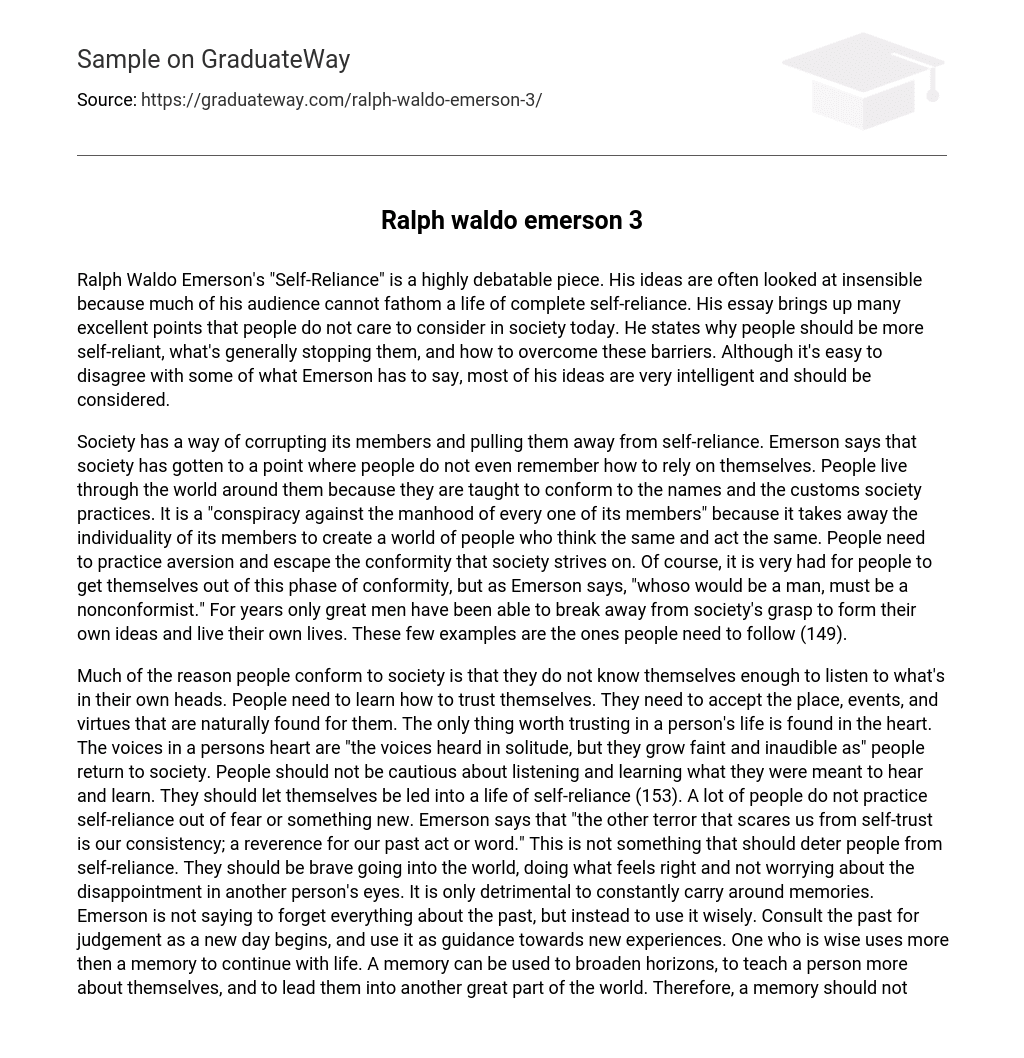Ralph Waldo Emerson’s essay “Self-Reliance” is a subject of frequent debate because of its challenging ideas. While many people find his views unrealistic, as they cannot fathom a life completely dependent on oneself, his essay brings up important points often overlooked in contemporary society. Emerson presents reasons why individuals should be more self-reliant, identifies common obstacles that hinder them, and suggests strategies to overcome these barriers. Although some may disagree with Emerson’s perspectives, the majority of his ideas are highly intelligent and warrant thoughtful consideration.
Emerson asserts that society corrupts individuals and diminishes their self-reliance, as they become overly reliant on external factors. This is due to societal pressure for conformity and the imposition of norms and traditions. Consequently, people lose their uniqueness and become part of a homogeneous population. To counter this, individuals must resist societal influence and liberate themselves from conformity. While Emerson acknowledges the challenges in escaping conformity, he believes that true manhood necessitates nonconformity. Throughout history, only a few exceptional individuals have managed to detach themselves from society’s grip and pursue their own ideas and lifestyles. These exemplary figures serve as role models for others (149).
Many individuals conform to societal norms because they lack self-awareness and are unsure of their own thoughts. It is crucial for people to develop trust in themselves and embrace the natural path, events, and virtues that lie ahead. The heart holds the only trustworthy aspect of one’s life. However, these inner voices become faint and indistinguishable as individuals rejoin society after moments of solitude. Therefore, it is important for people to listen attentively and learn what they are meant to hear and learn. They should allow themselves to be guided towards a life of self-reliance (153).
The fear of the unknown often inhibits individuals from practicing self-reliance. Emerson explains that another obstacle preventing people from trusting themselves is their reverence for past actions or words. Nevertheless, this should not discourage individuals from relying on themselves; instead, they should possess courage when facing the world and follow their intuition without worrying about disappointing others. Continuously carrying memories can be harmful; however, Emerson does not propose forgetting everything about the past but rather using it wisely.
As each new day begins, one should consult the past for judgment and utilize it as guidance for new experiences. Those who are wise rely on more than just their memories to navigate through lifeThe passage emphasizes the importance of memories in expanding horizons, self-discovery, and exploring new places. It also advises against allowing past experiences to hinder independent living (153).
According to Emerson, achieving self-reliance does not require complete isolation from society. Instead, individuals can maintain their independence while still being part of society. By breaking free from societal constraints without isolating oneself, individuals can fully realize their potential and explore life’s possibilities. It is essential for individuals to remain strong, listen to their own voices, and not give up when societal pressures threaten what truly matters. Unfortunately, self-reliance is often overlooked as a life goal. Although Emerson’s discussion may discourage readers from embracing it, self-reliance is actually a crucial aspect of one’s existence. While it is not necessary to become a recluse and sever ties with society, doing so can help individuals live life to its fullest potential. Self-reliance should be more commonly explored and practiced as a valuable quality.





